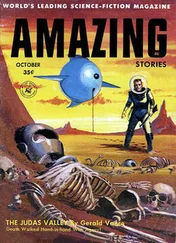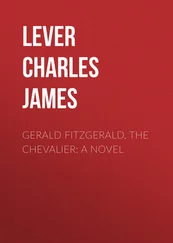But that night, looking through the lashes of her half-closed eyes, she saw Tick untying the blade of the spear. He worked for an hour before he got it loose, and then he had a sort of dirk, more than a foot long, which he concealed in a trouser-leg. Tack, she thinks, had been watching him also; for as soon as Tick closed his eyes and began to breathe evenly, he took out the knife which he had never allowed them to take away from him, and stabbed his partner through the heart.
He carried the body out of the range of her vision, and left it where he let it fall. Lalouette never knew where.
Next morning Tack said to her: ‘At last we are alone. You are my Queen.’
‘The fire?’ she said, calmly.
‘Ah yes. The fire. I will put wood on the fire, and then perhaps we may be alone after all this time.’
Tack went away and Lalouette waited. He did not return. The disposition of his bones, and the scars on them, indicated that he was killed by a boar. There was no more driftwood near-by. Tack went into the trees to pick up whatever he might find. As I visualise it, he stooped to gather sticks, and looked up into the furious and bloody eyes of a great angry boar gathering itself for a charge. This must be so: there is no other way of accounting for the scattering of his shattered bones. Hence, the last thing Tack saw must have been the bristly head of a pig, a pair of curled tusks, and two little red eyes….
* * *
The last words in what may be described as Lalouette’s Journal are as follows:
A wind is blowing. The fire is dying. God grant that my end may be soon.
This is the history of the Queen of Pig Island, and of the bones Captain Oxford found.
THE Carpathians have always been the rocky-breasted wet nurse of sombre and terrible fantasy. Dracula came out of these parts in which, as the peasants whisper, crossing themselves: ‘The dead ride hard.’ Hungary, and Austria, have always been breeding grounds for vampires, werewolves, witches, warlocks, together with their bedevilments and bewitchings.
Psychoanalysis started in these parts. There are hundreds of professional psychologists (witch-doctors) from most other countries in the world who have studied under Freud, Jung, Adler, Groddeck, and the rest. Most of them go away with unblinking conviction: a species of owl stuffed with conjecture curdled into dogma. It is interesting, by the way, to observe that most of these fumblers in the dark are in a state of permanent nervous breakdown – an occupational disease you get when you try to take someone else’s soul to pieces and clean it and reassemble it. No man in the world ever emptied his heart and mind in an analyst’s office or anywhere else – only madmen try, who do not know what they are talking about; their candour is fantasy.
Anglo-Saxons ought to leave psychology to take care of itself. They break their hearts trying to make an exact science of what – considering the infinite permutations and combinations of the human mind – can never crystallise out of mere philosophy. In the end, it all boils down to repetitive case-histories, reports, and other rubbish – sex in statistical tedium, with the spicy bits veiled in the obscurity of a dead language.
So, in effect, said that shrewd little mental specialist whom I will call Dr Almuna, when I met him in a select scientific group at a cocktail party. He runs the Almuna Clinic – a polite, expensive kind of looney bin not far from Chicago – and specialises in dope fiends and alcoholics.
Almuna is good company. This cheerful man who has kept clean because he has learned how to wash his hands in any kind of water – this Almuna, a kindly cynic, believes everything and nothing. There is nothing didactic about Dr Almuna: he admits that the more he knows he knows, the less he knows he knows.
Once, in the course of a conversation he said to me, in reply to a certain question: ‘know the lobes of a brain, and have followed the convolutions of many brains, and the patterns of behaviour of many men and women. And still I cannot pretend to understand. I try, believe me! But every human brain is a separate labyrinth. He would be a lucky man who, in a lifetime, got to the heart of anybody’s brain. No, no; quite simply, I do not try to explain. I treat, and endeavour to understand. The other way lies theory. Hence, fanaticism; and so delusion …’
On the occasion to which I have referred, when earnest professional men made a group and discussed cases, Dr Almuna was there, cocking his head like a parrot; one eye shut; avidly attentive. Some practitioner whose name I forget was talking of a case of ‘sympathetic pains’. He had investigated and thoroughly authenticated the case of a girl who, at three o’clock in the morning of 7 January 1944 uttered a piercing shriek and cried: ‘I’m shot!’ She pointed to a spot under the collarbone. There, mysteriously, had appeared a small blue dot, exquisitely painful to the touch. It transpired that exactly at that moment her brother, who was serving overseas, had been struck by a bullet in that very place.
Dr Almuna nodded, and said: ‘Oh, indeed, yes. Such cases are not without precedent, Doctor. But I think I can tell of an even more extraordinary instance of physical sympathy between two brothers …’
Smiling over his cigar, he went on:
* * *
These two brothers, let us call them John and William, they came to me at my clinic in Vienna, in the spring of 1924, before Mr Hitler made it imperative that I leave for foreign parts – even Chicago!
John came with his brother William. It was a plain case, open and shut, of dipsomania. Aha, but not so plain! Because there was such a sympathy between these brothers, William and John, that the weakness of the one affected the other.
William drank at least two bottles of brandy every day. John was a teetotaller – the very odour of alcohol was revolting to him. William smoked fifteen strong cigars a day. John detested the smell of tobacco smoke – it made him sick.
Yet account for this, if you like, gentlemen – William, the drunkard, and the smoker, was a harmless kind of fellow, while his brother John, the total abstainer, the non-smoker, showed every symptom of chronic alcoholism, cirrhosis of the liver, and a certain fluttering of the heart that comes of nicotine poisoning!
I do not suppose that any doctor has had the good luck to have such a case on his hands. There was William, breathing brandy and puffing cigar smoke like a steam engine, in the pink of condition; blissfully semicomatose; happy. And there was John, with a strawberry nose, a face like a strawberry soufflé, eyes like poached egs in pools of blood, fingers playing mysterious arpeggios all over the place – a clear case of alcoholic polyneurotic psychosis – but John had never touched a drop.
It was John who did most of the talking – the one with the strawberry nose. He said: ‘Dr Almuna, for God’s sake, stop him! He’s killing me. He’s killing himself, and he’s killing me.’
William said: ‘Pay no attention, Doc. John’s the man of nerves. Me, I take things easy.’
At this John cried: ‘Nerves! Damn you, William, you’ve torn mine to shreds!’
William said, quite placidly: ‘Give me some brandy, Doctor.’
And then you would have been amazed to see the play of expression on the face of John, the plaintive one. He folded his hands and gripped them tight to stop the tremor; and I have never seen a more remarkable combination of desire and revulsion in a human countenance.
‘Don’t!’ he said; and then: ‘… Well, Doctor, if you think it’s okay …’
Alas, that I should say it – to an inquiring mind, however well-disposed, all men are guinea-pigs. Besides, it might be argued, who was John to say what the suave and comfortable William might, or might not, have? Experimentally, if you like, I gave William three ounces of brandy in a measured glass. It went down like a thimbleful, and he smiled at me – a smile that was pleasant to see.
Читать дальше











